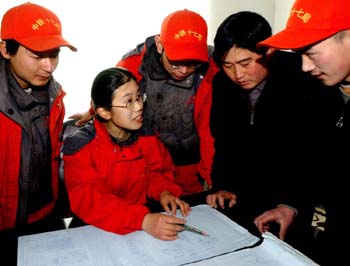| Tools: Save | Print | E-mail | Most Read |
| China Questions and Answers |
| Adjust font size: |
Q: The CPC used to admit members that were mostly politically advanced farmers and workers, but since the beginning of China's reform and opening up in the late 1970s, it has also been welcoming members from outstanding elements of the new social strata. Why is this? Will the change in composition affect the nature of the CPC? A: As it is commonly known, the CPC is the vanguard of the Chinese working class. Since its founding in 1921, farmers and workers have been the major social classes on which the Party is based. However, the advanced nature of the CPC is not completely determined by the family background and class origin of its members, but by its straight adherence to the theories and programs of Marxism-Leninism. As the party in power in a country with a population of 1.3 billion, the CPC is not only expected to stick to its class nature, but also to broaden its base in step with economic development and social progress. Today, with the deepening of economic reform, dramatic changes have taken place in China's socioeconomic structure, composition of the national economy and employment pattern. New social strata are emerging, such as the technical and managerial professionals employed by foreign-invested companies, founders and technical professionals of private hi-tech companies, self-employed people, private business owners, personnel engaged in intermediary agencies and freelancers. There is no lack of advanced elements among them. Most of these people, cherishing a deep love for the motherland and its people, and abiding by the Constitution and laws, have actively participated in the great cause of building socialism with Chinese characteristics. It is both necessary and possible for the CPC to admit those among them who subscribe to the Constitution and programs of the CPC, and who have proven to meet the requirements for CPC membership through a long period of tests. We believe that admitting advanced elements from other social strata will not change the nature of the Party because workers, farmers, intellectuals, members of the armed forces and leading officials still make up the backbone of the CPC, as the basic components of the Party. Instead, it will further enhance the Party's coherence and social influence. As well, we should look at more than the class origin and occupation of members to tell whether a party is a genuine workers' party. Over a long period of time, farmers constituted the majority in the CPC, while some Party members were from social strata other than the working class. Despite this, adhering to Marxist theories and programs, the CPC has attached great importance to its ideological development. Therefore the vanguard nature of the CPC has not changed, nor has the advanced character of the Party. Adhering to the nature of the vanguard of the Chinese working class does not necessarily mean rejecting the advanced elements from other social strata. Maintaining a vanguard nature while admitting other outstanding elements need not be contradictory goals -- instead, they can be combined.
|
| Tools: Save | Print | E-mail | Most Read |
 |
| Related Stories |
|
Product Directory China Search |
Country Search Hot Buys |
